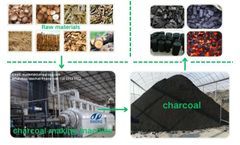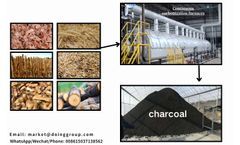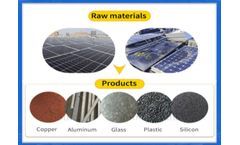Refine by
Global Articles & Analysis
1,355 articles found
Policy Drivers: Tightening Industrial Emissions Regulations The global industrial sector is experiencing unprecedented regulatory pressure to optimize combustion efficiency and reduce emissions. ...
This not only reduces the impact of waste on the environment, but also creates new economic value, in line with global sustainable development goals and regulatory standards. Our sustainable solar panels recycling process 1. ...
These innovations not only satisfy regulatory requirements but also align with global sustainability initiatives, positioning modern charcoal production as a responsible and technologically advanced ...
Integrated emission control devices (e.g., cyclone separators, spray towers) filter harmful gases, ensuring compliance with global standards. By converting biomass waste into charcoal, these machines also promote circular economies: - Use produced syngas as fuel to reduce external energy needs - Include basic emission control systems to minimize air pollution - Can process ...
A Market with Long-Term Potential The global BBQ charcoal market is projected to grow steadily over the next decade, fueled by outdoor leisure trends, eco-awareness, and increasing demand for natural fuel alternatives. ...
ISCC (International Sustainability and Carbon Certification) is a globally recognized certification scheme for sustainable and traceable supply chains. ...
It transforms previously discarded biomass into a marketable product, aligning with circular economy principles. As global emphasis shifts toward waste valorization, deploying a biomass pyrolysis plant becomes both an ecological imperative and an economic opportunity. ...
With the development of modern industry, the global energy crisis and environmental pollution issues have become increasingly acute. ...
This integrated approach combines efficient carbonization with emission control and by-product utilization, significantly reducing the overall environmental footprint of large-scale biochar production and meeting global sustainable development standards. We have decades of experience in designing and manufacturing reliable biomass pyrolysis machine for customers around the world. ...
As circular economy models advance, these technical strides in reactor engineering will continue to drive the global deployment of pyrolysis ...
Coconut shell charcoal burns hotter and cleaner than many traditional hardwood charcoals, making it a preferred option in environmentally conscious markets. Creating Global Market Opportunities With the rise in demand for sustainable products, coconut shell charcoal is now exported globally, especially for use in shisha, barbecuing, and activated carbon ...
With the rapid development of the global new energy industry, the demand for lithium-ion batteries continues to rise, which also brings about the problem of handling a large number of waste batteries. ...
As global emphasis on energy efficiency intensifies, advancements in pyrolysis technology have shifted toward optimizing heat utilization and minimizing energy loss. ...
As the world races toward net‑zero targets, understanding how lithium batteries power our planet as sustainably as possible is crucial for businesses, policymakers, and consumers alike. The Sustainability Imperative Global energy consumption continues to climb, driven by population growth, industrialization, and the digital economy. Yet burning fossil fuels remains the leading ...
One such solution that is gaining global attention is the biomass pyrolysis plant. These facilities, designed to convert organic materials into valuable byproducts like bio-oil, syngas, and biochar, are poised to play a crucial role in shaping the future of renewable energy and waste recycling. ...
Through carbon sequestration, emissions reduction, and biochar application, it addresses multiple ecological challenges simultaneously. As sustainability becomes a global priority, such machines offer practical, scalable solutions for cleaner energy and regenerative ...
The first few months of 2025 have been among the most economically turbulent in recent history, but despite this there are still signs anaerobic digestion (AD) will continue to play a key role in boosting energy security, tackling climate change, and managing organic wastes. The global biogas market was estimated to be worth USD 65.53 billion in 2024 and is projected to expand ...
Warehouses and distribution centers are at the heart of global commerce, yet traditional power solutions for forklifts—namely lead-acid batteries—are straining operations with high maintenance demands, safety concerns, and hidden costs. ...
According to the International Renewable Energy Agency (IRENA), the global amount of photovoltaic panel waste to be recycled will reach 8 million tons by 2030 and may exceed 78 million tons by 2050. ...
Gas analysis for the energy sector is essential in today’s rapidly evolving global energy landscape, where efficiency, safety, and regulatory compliance are non-negotiable. ...
















